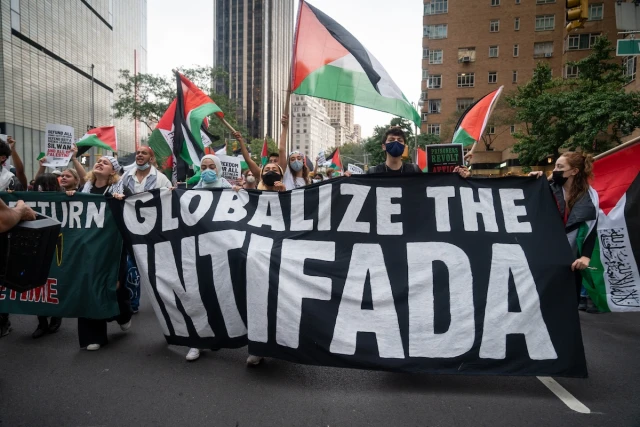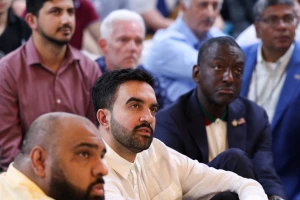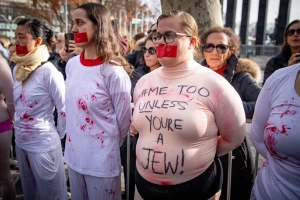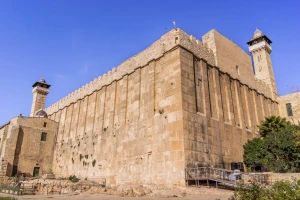The handwriting is on the wall for Diaspora Jews

Andrea Bocelli and Sarah Brightman’s iconic song, “Time to Say Goodbye,” could be the appropriate theme song for Diaspora Jews, especially those living in New York, after an organized antisemitic protest took place outside of Manhattan’s Park East Synagogue.
Scheduled to take place that evening was an event sponsored by Nefesh b’nefesh, an agency that assists American Jews to move to Israel.
Drawing a crowd of prospective immigrants, none of them probably expected to be confronted by a group of 200 angry demonstrators who shouted vile and crude statements including, “globalize the intifada,” “death to the IDF” and another one too vulgar to write, but directed at Jews, not Israel.
A perfect opportunity for the incoming mayor, Zohran Mamdani to make good on his promise that, upon taking office, he’d defend the city’s Jewish population, there was no full-throated condemnation by him of the reprehensible actions of these blatantly antisemitic protestors.
Mamdani’s pathetic response was that while he "believes every New Yorker should be free to enter a house of worship without intimidation, these sacred spaces should not be used to promote activities in violation of international law.
This troubling statement already demonstrates an infuriating overreach by Mamdani, whose resolute Muslim prejudices are transparently at play as he takes on the role of arbiter in determining what activities are deemed sacred enough to be conducted inside of a house of worship. I seem to recall bingo games and other secular pursuits being held in many churches when I lived in America, but I don’t remember anyone objecting.
But, in this case, New York’s mayor-elect is certain that a meeting involving the topic of Aliyah is unsuitable, to the point of it’s being in violation of international law.
This is truly perplexing, because the act of making Aliyah is commanded in the scriptures. The prophet Isaiah declared that God would “assemble the outcasts of Israel and gather together the dispersed of Judah from the four corners of the earth.” (11:12)
Given that an evening was dedicated to the furthering of the biblical injunction of Jews returning to their homeland, how would that, in any way, constitute a violation of international law?
Zohran Mamdani has been advised multiple times that New York is not subject to international law, much to his regret as he hopes to, one day, arrest Prime Minister Benjamin Netanyahu, should he ever step foot in the city.
But Mamdani, again, invokes this phrase when referring to the geographic areas of Judea and Samaria (known to him as disputed land and the occupied territories). By his way of thinking, anyone moving to that location would be in violation of international law.
Here is where he displays his total ignorance. Living in these settlements is in no way a violation of international law since there is no clear international consensus or recognized state with a legitimate government to whom that area belongs. Biblically and historically speaking, there is an indisputable case that it is rightly the property of Israel and the Jewish people.
Mamdani’s mistake is that he assumes that those who attended the event are all interested in moving to that area. More likely, many would choose to live in more established areas such as Jerusalem, Tel Aviv, Haifa or their surrounding areas, where finding work is much easier.
But, to Mamdani, all of Israel constitutes a violation. As he has stated unequivocably, Israel does not have the right to exist as a Jewish state, because it then has a hierarchy of race and religion.
For a devoted Muslim, such a statement is a bit hypocritical, given the 53 Arab countries where Islam is the dominant culture, religion and lifestyle. It’s quite begrudging, on his part, to deny the Jewish people ONE homeland where they are the majority, guaranteeing their safety and shared peoplehood.
But it is that one Jewish country which Mamdani cannot accept, advocating against the status inequities of non-Jewish residents. Such is the position of a man who is probably less motivated by what he calls a social disparity and more motivated by his dislike for all things Jewish.
His past record, easily accessed via Google, speaks loudly when it comes to his real sentiments regarding the nation of Israel as well as the Jewish people.
Calling the Palestinian cause “central to his identity, both in and out of politics,” it won’t be unexpected for him to inject his biased prejudices into the N.Y. Jewish community, despite his pledge to protect them.
Why didn’t he call out Wednesday night’s demonstrators who unashamedly said, “It is our duty to make them (Jews) think twice before holding these events. We need to make them scared.”
Undoubtedly, they are frightened, realizing that the handwriting is on the wall for them – beckoning serious consideration to leave the place they have called home for the place that is their true destiny as a collective people.
A mayor-elect whose tepid response is to “discourage the language used at the protest,” is not someone who will staunchly defend the rights and protections of the sizable Jewish population in his city.
Claiming to be focused on “affordability,” all signs point to his taking on the more pressing and deeper passion that has been burning inside of him, well before he founded the Students for Justice in Palestine organization at Bowdoin University back in 2013.
For him, it will likely become an ongoing crusade to right the injustices he feels are being aided by New York Jewish businesses, organizations and individuals, where he will be the acting authority. By working to upend their influence, assistance or support of Jewish causes and the land of Israel, overstepping his bounds, as he has in this latest synagogue incident, is sure to happen.
Fear is a powerful motivator, and that is the reason why a recent editorial in the Jerusalem Post encouraged the New York Jewish community to seriously consider purchasing a home in Israel, even if they are not yet poised to make an immediate move.
As it reads, “Buying a home in Israel will not solve antisemitism in Brooklyn or on American campuses... yet the question for many Jews is starting to sound less like ‘Should I buy in Tel Aviv or stay in New York? In an age of multiplying uncertainties, where do I want my family’s emergency key to fit?”

A former Jerusalem elementary and middle-school principal who made Aliyah in 1993 and became a member of Kibbutz Reim but now lives in the center of the country with her husband. She is the author of Mistake-Proof Parenting, based on the principles from the book of Proverbs - available on Amazon.
You might also like to read this:











